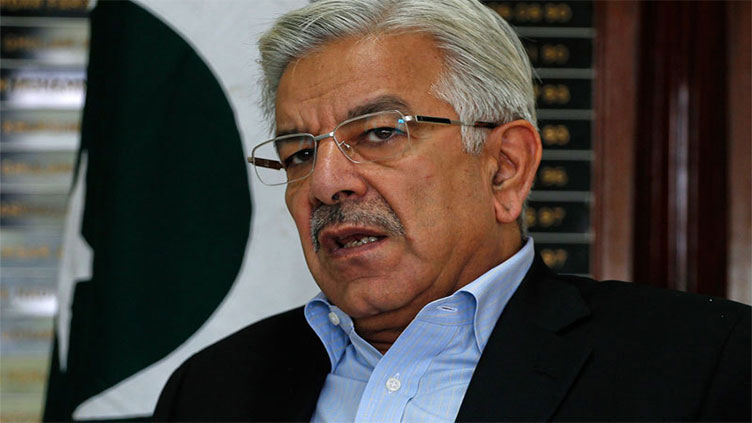Pakistan has no problem with US-India partnership: Khawaja Asif

Pakistan
Pakistan has no problem with US-India partnership: Khawaja Asif
NEW YORK (APP) – Pakistan has no problem with the United States developing a partnership with India if it is not at Islamabad’s cost, Defence Minister Khawaja Asif said in an interview with Newsweek, a leading American magazine.
“I think we do not have any problem with the United States developing a partnership with India if it is not at the cost of Pakistan,” he said, ahead of Indian Prime Minister Naredra Modi’s visit to Washington where he is set have talks with President Joe Biden on June 22.
“That is one. And balancing between the relationship with United States and our regional partners, again, it is not like that. We have common borders with China, we have common borders with Afghanistan, Iran, India,” Khawaja Asif said.
In the interview, he argued that substantial improvement is need to ensure Pakistan’s stability, and key to that improvement is maintaining the increasingly difficult geopolitical balancing act between Washington, Beijing and other powers with whom Islamabad seeks good ties. Such relations, he underscored, are particularly important as Pakistan attempts to not only promote trade, but also counter the increasing threat of cross-border terrorist attacks.
About India, Khawaja Asif said that ever since Modi came into power some 10 years ago, the Indian outlook towards regional politics completely changed, with the abandonment of the secular ideology, which the country pursued since 1947.
“If you look at his (Modi’s) politics in Gujarat, it was again based on anti-minority, it is based on communal tensions and of voting Hindu nationalist support by fanning sentiments against the community, and minorities, both Muslims, Christians, Buddhists, and so many other communities that are very large,” he said.
“That has actually aggravated the situation between the two countries, with India taking a very nationalistic stand within the country, and obviously, India is a very big market, over 1.3 billion people. Everywhere in the world, the other big economies will need to have them as partners.
“But Pakistan is not a very big economy, and [is] a vulnerable economy. All we have is a geographical location, which is strategic, which attracts, I would say, not all the good things, it sometimes attracts some things which really make us even more vulnerable.:
Pakistan would like good relationships with all the countries, he stressed. “We would like to improve our relationships with them if the relationship is not good.
“We want to live in peace. If there is no peace there, we will never be able to restore our economy the way we want to restore it,” Khawaja Asif added.
“So, I personally feel that some appreciation is required in Washington about our situation, and we should not be pushed into a situation where we have to make some very hard choices. Our relationship with America for us is very valuable. It has its history. It has some disappointments, some huge disappointments, but still we value our relationship with the United States and we want that relationship to flourish.
“We are big trade partners, we have a very large Pakistani diaspora in the United States and Pakistani interests over there. So, their business interests are also, considering our size, they are quite attractive and large.”
The defence minister said Pakistan’s nuclear assets were “not for any jingoistic or hostile intentions.”
Since we attained nuclear capability, he said, the skirmishes, the wars, the battles between India and Pakistan have not escalated the way they escalated way back in 1965, and 1948, and then 1971.
“These were large-scale wars between India and Pakistan. We have had some sort of tension between India and Pakistan, but they are short-lived tensions, military tensions or border tensions.
“So, I think it’s something which underwrites our security, it’s not for any hostile—no, absolutely no, absolutely not. India had become a nuclear power. And we were compelled not to be gobbled by India over the years or over the decades. This is something which underwrites the peace in our region and to a great extent, our security.”
In the interview, Khawaja Asif also accused PTI chief of orchestrating the May 9 riots.
“The people were trained, they were given instructions and they had the agenda, a very clear-cut agenda in front of them. Because all over Punjab and KP [Khyber Pakhtunkhwa], no official building or banks or markets were touched,” he pointed out.
“It happens in the United States of America when there is rioting, people go on a rampage in market areas and other places, on banks, but nothing of the sort. Exclusively, the military installations were attacked. The corps commander in Lahore, his house was attacked. Air Field Mianwali, which is an airbase, which is a very strategic thing for us, was attacked. The forts in KP, where frontier constabulary are facing Afghanistan, it was attacked. Then, GHQ, the General Headquarters.
“So, all these installations, they are basically the symbols of our defense. And you know, we live in a geography where we have a hostile neighborhood just next door. So, for us, or for any other country, for even the US, the symbols of their defense capability, or symbols of their army and armed forces are always something which is sacrosanct. And he deliberately attacked because he has been always saying that I’m not ready to negotiate with any politician, I have to talk to the establishment.”

